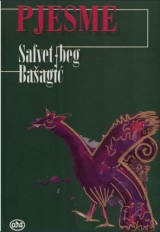Safvet-beg Bašagić (wrote under the pseudonym Mirza Safvet), born on 6 May 1870 in Nevesinje, was one of the most prominent personalities of modern Bosnian and Bosniak literature and the initiator of the Bosniak national revival at the beginning of the 20th century.
He attended primary and comprehensive schools in Mostar and Konjic. In 1882 the family moved to Sarajevo, where he attended the Islamic secondary school, then from 1885 to 1895 the Sarajevo grammar school. From 1895 to 1899 he studied Arabic and Persian at the University of Vienna. He then became a professor of oriental languages at the University of Zagreb.
He already wrote poetry as a high school student in Sarajevo. During his studies in Vienna, he prepared his first collection of songs (Trofanda iz hercegovačke dubrave) for printing and began writing his first scientific treatises and collecting material on the history of Bosnia. On May 1, 1900, he became the editor of the Behar journal together with Edhem Mulabdić and Osman Nuri Hadžić.
He is the founder of many newspapers, magazines and national associations. He is known as an outstanding poet, translator, historian and politician. Safvet-beg Bašagić published the “Brief Introduction to Bosnia’s Past from 1463 to 1850” in 1900, which was used by Muhamed Hadžijahić as a standard study of Bosnian history until the publication of the book “The Genesis of National Questions of Bosnian Muslims” by Muhamed Hadžijahić. In 1894 he accepted the invitation to lay the foundation stone of the Starčevićev dom (Zagreb).
From 1900 he worked as a professor of Arabic language at the Great Gymnasium in Sarajevo until 1906, when he was dismissed under the pretext of not having passed the professorship.
In 1903 he founded the Gajret Association, then the El-Kamer and Muslim Club Associations. In 1907 he started the journal Ogledalo (The Mirror), one year later he went to Vienna and worked on his doctoral thesis “The Bosniacs and Herzegovinians in Islamic Literature” which he defended in 1910 and obtained the degree of Doctor ex linguis islamiticis.
In the same year he was elected as a representative in the Bosnian Parliament and shortly after Ali-beg Firdus’ death he was appointed a chairman of the parliament. In this position, he experienced the collapse of the Austro-Hungarian monarchy. After the war, from 1919 he worked as a curator at the Zemaljski muzej in Sarajevo until 1927 when he retired.
Bašagić’ collection of Islamic writings and old books owned by the Bratislava University Library is part of the UNESCO Memory of the World Programme. Part of this collection is available online through the World Digital Library.
He died on 09 April 1934 in Sarajevo and was buried in the cemetery of the Begova Mosque.

